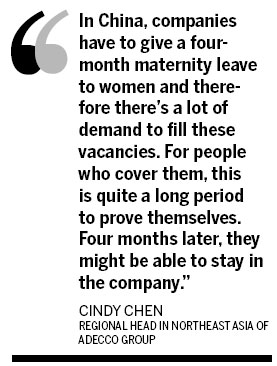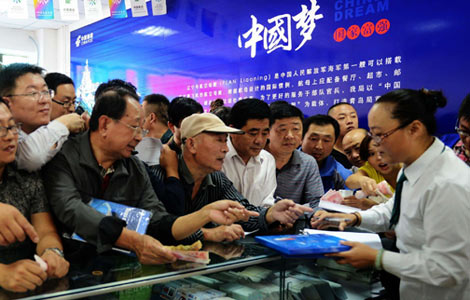Global firms facing human resources challenges in Asia
Updated: 2013-10-09 07:41
By Zheng Yangpeng (China Daily)
|
||||||||
It's tough for firms to get and keep the right people, who are often quick to seize new opportunities
While companies in Europe are struggling with sluggish demand and a gloomy employment market, Asia seems a land of promise: booming economies, robust demand, and a resilient job market.
But for those who are actually doing business here, there are also some challenges: the business opportunities are there but local competition is fierce, and while the supply of college graduates is huge, the right candidates are hard to find, and when they are found, the prosperous market means that they may easily move to rival firms.
Cindy Chen, regional head in Northeast Asia of Adecco Group, a Switzerland-based global human resources company, said in an interview with China Daily that retaining talent is the biggest headache for multinational companies operating in Asia and China.
"The complaint here is that after companies spend considerable time and money to cultivate satisfying talent, then it's time for them to hop," she said.
"It's never easy to cultivate good talent. But the problem is that good talent in some markets is in great demand and employers compete with each other for it. As a result, bidding prices have soared and it's getting increasingly hard for the original employers to keep the talent," Chen added.
To address this problem, her suggestion is to ensure good communication with local staff. It's always necessary to present a clear picture so that employees can easily understand where will they be two or five years later, and what the company expects from them if they want to get promoted.
"It's critical to convince them that if they hop to another company just for the salary, they have to start all over again while they've already built a solid foundation," Chen said.

Another headache for multinationals, according to Chen, who has been with Adecco for 20 years, is a shortage of skills: on the one hand, tens of thousands of college graduates are struggling to secure jobs; on the other multinationals are desperate to hire experienced people with the expertise they need.
This is an area where Chen's company could play a role. Operating in 60 countries and territories, Adecco serves 100,000 clients, mostly multinationals, with around 700,000 candidates dispatched every day. Chen said that Adecco is committed to be a partner for multinationals to come up with innovative human resource solutions in each market.
For example, many multinationals have to fill vacancies with temporary, lower-skilled workers. And many college graduates are finding it difficult to land long-term jobs. Adecco reached out to those graduates, providing them with training programs and then sending them to fill those vacancies. College graduates got a chance to see if they are interested in some fields and accumulated work experience, while companies found a more flexible workforce.
"In China, companies have to give a four-month maternity leave to women and therefore there's a lot of demand to fill these vacancies. For people who cover them, this is quite a long period to prove themselves. Four months later, they might be able to stay in the company," Chen said.
This is an example of how Adecco helps young people to get a first job. And as they mature and get more competent, Adecco might help them to seek another employer. This model applies to employers as well, according to Chen: for start-up companies it's sometimes necessary to find the right workers as soon as possible; and when companies grow and expand their business, staff training, headhunting and business outsourcing become ever more important. Also, when companies merge, Adecco helps them to deal with severance packages and possible job placement opportunities.
For job seekers, an important tip Chen offers is: eye long-term career advancement rather than salaries. "A good 'platform' should always come first. Many college graduates care about their titles. But the question is, is the title really as tempting as it sounds? If it is, can you take the heavy responsibility?"
For instance, State-owned enterprises are increasingly popular among college graduates. But one should think carefully before joining one: can a job in a SOE boost one's competency? If a job seeker aspires to become a global talent, is a multinational a better "platform" even if it means less stability?
Opportunities can be exciting, but they can also be bewildering. For young people, living in Asia and China at this time is a blessing. But just as Chen said, in China, now the problem is not whether there are enough opportunities or not, but whether one can work wholeheartedly and master the job, not be mastered by it.
zhengyangpeng@chinadaily.com.cn
(China Daily USA 10/09/2013 page14)

 Last photos of Hungarian wingsuit diver
Last photos of Hungarian wingsuit diver
 In photos: Typhoon Fitow aftermath
In photos: Typhoon Fitow aftermath
 Japan-US military drill raises tension
Japan-US military drill raises tension
 Higgs and Englert win physics Nobel prize
Higgs and Englert win physics Nobel prize In Bali, they relax in local fashions
In Bali, they relax in local fashions
 Post office for Liaoning carrier opens
Post office for Liaoning carrier opens
 A smog-filled Beijing targets polluting cars
A smog-filled Beijing targets polluting cars
 Animal welfare to be added in training
Animal welfare to be added in training
Most Viewed
Editor's Picks

|

|

|

|

|

|
Today's Top News
Trending News across China on Oct 9
Xiaomi's Barra ready to take on Beijing
A day of cultural exchange at Pace University
ZTE, Houston Rockets shooting for global markets
Global firms facing HR challenges in Asia
Back to 1942, entered for the 86th Oscars
Obama says he'll negotiate once 'threats' end
New Fed chief to be nominated
US Weekly

|

|







